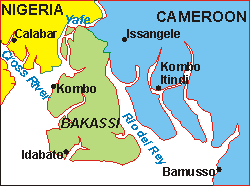|
afrol News, 27 March - The peninsula of Bakassi is a tiny landstrip consisting of a series of fluvial islands covering approximately 50 square kilometres and inhabited by some dozens of villages. Cameroon and Nigeria both claim sovereignty and have nourished the dispute for eight years at the International Court of Justice. Even Equatorial Guinea wants its saying. The dispute is, of course, about potential offshore oil resources. The International Court of Justice is soon to decide on the border dispute as Nigeria and Cameroon are presenting final arguments at the UN Court in The Hague today. The case, starting with a surprise complaint filed by Cameroon in 1994 - thus demanding sovereignty over Bakassi and the withdrawal of Nigerian troops - has developed into a case over the entire Nigeria-Cameroon land and maritime border, also affecting the southern neighbour Equatorial Guinea. Under Nigerian protests, Cameroon achieved in 1996 that the UN Court included the entire boundary of the two countries, including disputed islands in Lake Chad and the maritime borders in the Gulf of Guinea, which depend on the sovereignty of Bakassi. Nigeria claimed the Court had no jurisdiction as there was no legal dispute about the maritime borders before the Bakassi case was resolved, but in a judgment of 11 June 1998, the Court rejected this contention. Equatorial Guinea stepped into the case in 1999, concerned by Cameroonian claims over maritime borders in the potentially oil-rich offshore areas. Equatorial Guinea, without seeking to become a party to the case, was further alarmed by Cameroonian claims it had not maritime borders with its southern neighbour. Also the Court admitted its ruling might have consequences for later maritime border disputes between Cameroon, Equatorial Guinea and Sao Tomé and Principe. As all these four countries are involved in oil production in the Gulf of Guinea, much is at stake.
Cameroon seeks the sovereignty of the Bakassi peninsula and Darak island in Lake Chad, based on its interpretation of a 1913 border treaty between the German and British colonial powers. It further claims large maritime concessions. Nigeria claims another interpretation of British protection contracts of 1884, including the villages of Bakassi and is backed by the local population, claiming to be Nigerian. On Lake Chad, Nigeria claims the Court does not have jurisdiction as it is a matter of the Lake Chad Basin Commission, where also Chad and Niger have legal concerns. Further, Nigeria holds that Cameroon's maritime claims are "excessive" and that, due to the interests of other parties, the Court has no jurisdiction. Nigeria, Equatorial Guinea and Gabon - and soon Sao Tomé - base their economy on the oil resources in the Gulf of Guinea. Cameroonian oil resources in the Gulf are already close to depleted. There are so far no maritime delimitations in the Gulf, although Nigeria and Sao Tomé have agreed on joint economic zones. The Bakassi case has marred the two countries for decades. Only in January this year, a woman on Bakassi was shot and several others wounded by the Cameroonian gendarmes storming a Nigerian village. Locals stated that, "but for the Nigerian troops stationed in the Peninsula, the entire people there would have been eliminated," a long time ago. Further complicating the Nigeria-Cameroon dispute is a complaint by some Anglophone Cameroonians, taking Nigeria to the Court for Nigeria's alleged neglect of their interests in the 1960s. Anglophone Cameroon, administered by British Nigeria between 1918 and 1961, is seeking autonomy, which is the real case behind taking Nigeria to th UN Court. The case has relevance, as the Bakassi dispute could end up a dispute between Nigeria and an autonomous Anglophone Cameroon and is seen as helpful by Nigerian authorities. Sources: Based on ICJ, Nigerian govt., press reports and afrol archives
|
front page
| news
| countries
| archive
| currencies
| news alerts login
| about afrol News
| contact
| advertise
| español
©
afrol News.
Reproducing or buying afrol News' articles.
You can contact us at mail@afrol.com

